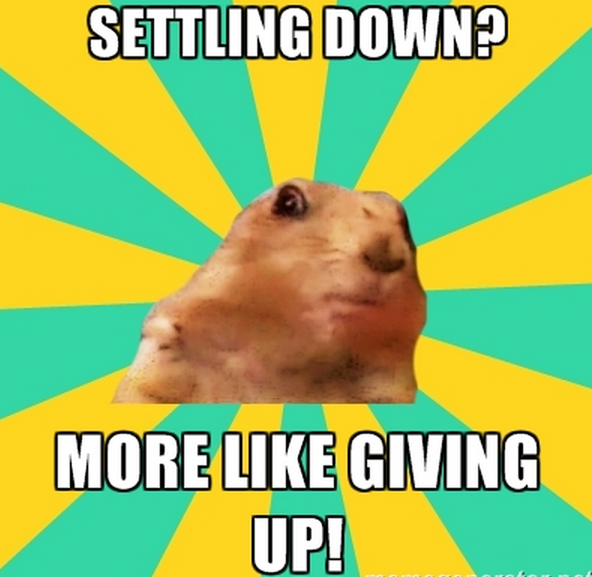I was talking to my sister the other day, and a mutual friend who'd had a serious, semi-scary "party phase," and with whom I'd recently reconnected, came up.
"He really seems to have settled down," I said.
I meant it as a positive commentary on the fact that his life now involves far fewer drugs and far more stability than it used to.
But it got me to thinking about the words we use to express that (because what writer wants to take words at face value when instead she can get confused and upset and obsessed by their iceberg natures?): "settling down."
Isn't it kind of sad that at the root of the idea that someone has found a long-term romantic prospect, or reached a good place in her career, or moved to a city that's he can see himself calling home indefinitely, is the word "settling?"
And both senses of the word are kind of depressing; it's not just the connotation of giving up and saying "good enough, I guess" that bugs me, it's the idea that you're losing your forward momentum, "settling" into place, forever relinquishing the potential of the other slots in life's roulette wheel that you're no longer skipping past.
Obviously plenty of people who settle down ARE settling. They're too tired, or scared, or worried about what other people will think to say "I can still do better."
But I hope that's not everyone. I certainly hope it's not me.
So next time I talk to you about the mutual acquaintance who seems to be drinking less and fitting in more yoga, don't get confused if I mention that I'm so happy she's "continuing forward" or "growing sideways" or even just "making positive choices."
Assuming all those things are true, the one thing she's NOT doing is "settling."

Another perspective is society's expectation for you to "settle" down. "Continuing forward" can still be viewed as a negative, an unfulfilled notion of "still not having there stuff together". Perhaps it is this notion that we subconsciously or consciously aspire to "settle" down. Mid-life crisis can arise from this need to "continue forward" and the satisfaction of accomplishing "settling down". Great article, self-critical and poignant, I like it.
ReplyDeleteSo glad you liked it!
ReplyDelete